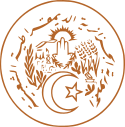
The Constitution of the Irish Free State was adopted by Act of Dáil Éireann sitting as a constituent assembly on 25 October 1922. In accordance with Article 83 of the Constitution, the Irish Free State Constitution Act 1922 of the British Parliament, which came into effect upon receiving the royal assent on 5 December 1922, provided that the Constitution would come into effect upon the issue of a Royal Proclamation, which was done on 6 December 1922. In 1937 the Constitution of the Irish Free State was replaced by the modern Constitution of Ireland following a referendum.

The Fifth Republic is France's current republican system of government. It was established on 4 October 1958 by Charles de Gaulle under the Constitution of the Fifth Republic. The Fifth Republic emerged from the collapse of the Fourth Republic, replacing the former parliamentary republic with a semi-presidential system that split powers between a president as head of state and a prime minister as head of government. De Gaulle, who was the first French president elected under the Fifth Republic in December 1958, believed in a strong head of state, which he described as embodying l'esprit de la nation.
A constitutional amendment is a modification of the constitution of a polity, organization or other type of entity. Amendments are often interwoven into the relevant sections of an existing constitution, directly altering the text. Conversely, they can be appended to the constitution as supplemental additions, thus changing the frame of government without altering the existing text of the document.

A constituent assembly is a body assembled for the purpose of drafting or revising a constitution. Members of a constituent assembly may be elected by popular vote, drawn by sortition, appointed, or some combination of these methods. Assemblies are typically considered distinct from a regular legislature, although members of the legislature may compose a significant number or all of its members. As the fundamental document constituting a state, a constitution cannot normally be modified or amended by the state's normal legislative procedures in some jurisdictions; instead a constitutional convention or a constituent assembly, the rules for which are normally laid down in the constitution, must be set up. A constituent assembly is usually set up for its specific purpose, which it carries out in a relatively short time, after which the assembly is dissolved. A constituent assembly is a form of representative democracy.

The Constitution of India is the supreme law of India. The document lays down the framework that demarcates fundamental political code, structure, procedures, powers, and duties of government institutions and sets out fundamental rights, directive principles, and the duties of citizens. It is the longest written national constitution in the world.

The current Constitution of France was adopted on 4 October 1958. It is typically called the Constitution of the Fifth Republic, and it replaced the Constitution of the Fourth Republic of 1946 with the exception of the preamble per a Constitutional Council decision in July 1971. The current Constitution regards the separation of church and state, democracy, social welfare, and indivisibility as core principles of the French state.

The flag of Mauritania is a green field containing a gold star and crescent, with a red stripe at the top and bottom of the field. The original national flag was introduced under the instructions of President Moktar Ould Daddah and the constitution of 22 March 1959 and was adopted on 1 April 1959.

The Corwin Amendment was a proposed amendment to the United States Constitution that was never adopted. It would shield "domestic institutions" of the states from the federal constitutional amendment process and from abolition or interference by Congress. Although the Corwin Amendment does not explicitly use the word slavery, it was designed specifically to protect slavery from federal power. Congress proposed the Corwin Amendment on March 2, 1861, shortly before the outbreak of the American Civil War in order to keep border states from seceeding. It passed Congress but was not ratified by the requisite number of states.

Algeria elects on national level a head of state - the president - and a legislature. The president is elected for a five-year term by the people. People's National Assembly has 407 members, elected for a five-year term in multi-seat constituencies by proportional representation. Eight seats in the national assembly are reserved for Algerians abroad. The Council of the Nation has 144 members, 96 members elected by communal councils and 48 members appointed by the president. Algeria has a multi-party system, with numerous political parties in which no one party often has a chance of gaining power alone, and parties must work with each other to form coalition governments. According to a US Embassy cable, the 2009 presidential elections were "carefully choreographed and heavily controlled", with the official turnout figure "exaggerated" by at least 45%.

Even before attaining its independence from Spain, Cuba had several constitutions either proposed or adopted by insurgents as governing documents for territory they controlled during their war against Spain. Cuba has had several constitutions since winning its independence. The first constitution since the Cuban Revolution was drafted in 1976 and has since been amended. In 2018, Cuba became engaged in a major revision of its constitution, which was widely discussed by the people and by academics. The current constitution was then enacted in 2019.

The Constitution of Ukraine is the fundamental law of Ukraine. The constitution was adopted and ratified at the 5th session of the Verkhovna Rada, the parliament of Ukraine, on 28 June 1996. The constitution was passed with 315 ayes out of 450 votes possible. All other laws and other normative legal acts of Ukraine must conform to the constitution. The right to amend the constitution through a special legislative procedure is vested exclusively in the parliament. The only body that may interpret the constitution and determine whether legislation conforms to it is the Constitutional Court of Ukraine. Since 1996, the public holiday Constitution Day is celebrated on 28 June.

An Algerian Constitution was first adopted by a referendum in 1963, following the Algerian War of Independence (1954–62); originally, it was to be drafted by a constitutional assembly led by Ferhat Abbas, but this body was sidelined by Algeria's first President, Ahmed Ben Bella. In its 1963 form, the constitution declared Algeria a one-party state ruled by the former resistance movement, the National Liberation Front (FLN). This constitution was suspended by the military coup d'état of 1965. After years of ruling by executive fiat as leader of the Revolutionary Council, Houari Boumédienne issued a second constitution in 1976, emphasizing the importance of socialism and - formally - restoring political institutions to their primacy over the military establishment.
The Fundamental Law of Hungary, the country's constitution, was adopted by parliament on 18 April 2011, promulgated by the president a week later and entered into force on 1 January 2012. It is Hungary's first constitution adopted within a democratic framework and following free elections.

The Constitution of Georgia is the supreme law of Georgia. It was approved by the Parliament of Georgia on 24 August 1995 and entered into force on 17 October 1995. The Constitution replaced the Decree on State Power of November 1992 which had functioned as an interim basic law following the dissolution of the Soviet Union.
The Algerian Constitution of 1996 was passed in a referendum in 1996. It is the fundamental law of Algeria. The constitution was amended in 2002, 2008, 2016., and 2020.

In France, the French constitution of 4 October 1958 was revised many times in its early years. Changes in this fundamental law have become more frequent since the 1990s. This has had two major causes: the desire to modernize public institutions on one hand, and adapting to the European Union and to international law on the other.

Abdelmadjid Tebboune is an Algerian politician currently serving as the President of Algeria since December 2019 and as Minister of Defence.

The 2019–2021 Algerian protests, also called Revolution of Smiles or Hirak Movement Arabic: الحِرَاك, romanized: al-Ḥirāk, lit. 'The movement', began on 16 February 2019, six days after Abdelaziz Bouteflika announced his candidacy for a fifth presidential term in a signed statement. These protests, without precedent since the Algerian Civil War, were peaceful and led the military to insist on Bouteflika's immediate resignation, which took place on 2 April 2019. By early May, a significant number of power-brokers close to the deposed administration, including the former president's younger brother Saïd, had been arrested.

The 2020 Algerian constitutional referendum was held on 1 November 2020. The subject of the referendum was a revision of the Algerian constitution, and it follows a series of protests known as Hirak.

The Constitutional Council of Algeria was an Algerian judicial body from 1963 to November 2021.















